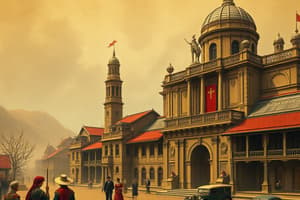Podcast
Questions and Answers
What does the study of history primarily involve?
What does the study of history primarily involve?
- Analysis of financial records
- Observation of environmental changes
- Study of animal behavior
- Interpretation of historical records and artifacts (correct)
Which period is characterized by the emergence of writing systems?
Which period is characterized by the emergence of writing systems?
- Ancient Civilizations (correct)
- Prehistoric Era
- Classical Antiquity
- Middle Ages
What was a key feature of the Middle Ages?
What was a key feature of the Middle Ages?
- Spread of major religions (correct)
- Technological advancements
- Cultural revival in art and science
- Rise of empires in the Americas
Which historian is known as the 'Father of History'?
Which historian is known as the 'Father of History'?
What characterizes the Industrial Revolution?
What characterizes the Industrial Revolution?
In historical methodology, what are primary sources?
In historical methodology, what are primary sources?
What is primarily studied in military history?
What is primarily studied in military history?
Which of the following is not a type of history?
Which of the following is not a type of history?
Flashcards are hidden until you start studying
Study Notes
Definition of History
- Study of past events, particularly in human affairs.
- Involves interpretation of historical records and artifacts.
Importance of History
- Understanding societal development and cultural heritage.
- Provides context for current events and trends.
- Teaches critical thinking through analysis of historical sources.
Key Periods in History
-
Prehistoric Era
- Time before written records.
- Study of archaeology and anthropology.
-
Ancient Civilizations
- Emergence of writing systems (e.g., cuneiform, hieroglyphics).
- Major civilizations: Mesopotamia, Ancient Egypt, Indus Valley, China, Mesoamerica.
-
Classical Antiquity
- Rise of empires (e.g., Roman, Persian, Maurya).
- Development of philosophy, science, and art.
-
Middle Ages
- Feudalism and the rise of kingdoms in Europe (5th-15th centuries).
- Spread of major religions: Christianity, Islam.
-
Renaissance and Reformation
- Cultural revival in art and science (14th-17th centuries).
- Challenges to religious authority; rise of Protestantism.
-
Age of Exploration
- European exploration and colonization (15th-17th centuries).
- Impact on indigenous populations and global trade.
-
Industrial Revolution
- Transition to industrial economies (18th-19th centuries).
- Societal changes, urbanization, and technological advancements.
-
Modern Era
- World Wars and geopolitical shifts (20th century).
- Cold War, globalization, and technological advancement.
Historical Methodology
- Primary Sources: Original documents, artifacts, eyewitness accounts.
- Secondary Sources: Analyses, interpretations, or summaries of primary sources.
- Historiography: Study of historical writing and interpretation over time.
Types of History
- Political History: Focus on governance, policies, and leaders.
- Social History: Study of societal structures and everyday life.
- Economic History: Analysis of economic systems and practices.
- Cultural History: Examination of cultural expressions and developments.
- Military History: Study of conflict, war, and military strategy.
Notable Historians
- Herodotus: "Father of History," known for his work on the Greco-Persian Wars.
- Thucydides: Writings on the Peloponnesian War; emphasized factual accuracy.
- Karl Marx: Historical materialism; focused on the role of economic factors in history.
- Fernand Braudel: Introduced the concept of the longue durée in historical time.
Key Concepts
- Continuity and Change: Understanding what remains constant and what evolves over time.
- Causation: Analyzing causes and effects of historical events.
- Historical Perspective: Considering the beliefs and values of people in the past.
Definition of History
- The study of past events, particularly in human affairs.
- Involves the interpretation of historical records and artifacts.
Importance of History
- Provides understanding of societal development and cultural heritage.
- Offers context for current events and trends.
- Develops critical thinking skills through analysis of historical sources.
Key Periods in History
- Prehistoric Era: Time before written records, studied through archaeology and anthropology.
- Ancient Civilizations: Birth of writing systems (e.g., cuneiform, hieroglyphics) and major civilizations like Mesopotamia, Ancient Egypt, Indus Valley, China, and Mesoamerica.
- Classical Antiquity: Rise of empires (Roman, Persian, Maurya), and significant advancements in philosophy, science, and art.
- Middle Ages: The era of Feudalism and the ascension of kingdoms in Europe (5th-15th centuries), marked by the spread of major religions like Christianity and Islam.
- Renaissance and Reformation: Cultural rebirth in art and science (14th-17th centuries), challenges to religious authority, and the rise of Protestantism.
- Age of Exploration: European exploration and colonization (15th-17th centuries), greatly impacting indigenous populations and global trade.
- Industrial Revolution: Transition to industrial economies (18th-19th centuries), leading to societal change, urbanization, and technological advancements.
- Modern Era: World Wars and geopolitical shifts (20th century), characterized by the Cold War, globalization, and further technological advancements.
Historical Methodology
- Primary Sources: Original documents, artifacts, eyewitness accounts.
- Secondary Sources: Analyses, interpretations, or summaries of primary sources.
- Historiography: Study of historical writing and interpretation over time.
Types of History
- Political History: Focuses on governance, policies, and leaders.
- Social History: Studies societal structures and everyday life.
- Economic History: Analyzes economic systems and practices.
- Cultural History: Examines cultural expressions and developments.
- Military History: Studies conflict, war, and military strategy.
Notable Historians
- Herodotus: Known as the "Father of History" for his work on the Greco-Persian Wars.
- Thucydides: Famous for his writings on the Peloponnesian War, emphasizing factual accuracy.
- Karl Marx: Developed historical materialism, focusing on the role of economic factors in shaping history.
- Fernand Braudel: Introduced the concept of the longue durée, emphasizing long-term historical trends.
Key Concepts
- Continuity and Change: Recognizing aspects that remain constant and those that evolve over time.
- Causation: Analyzing the causes and effects of historical events.
- Historical Perspective: Understanding the beliefs and values of people in the past.
Studying That Suits You
Use AI to generate personalized quizzes and flashcards to suit your learning preferences.




